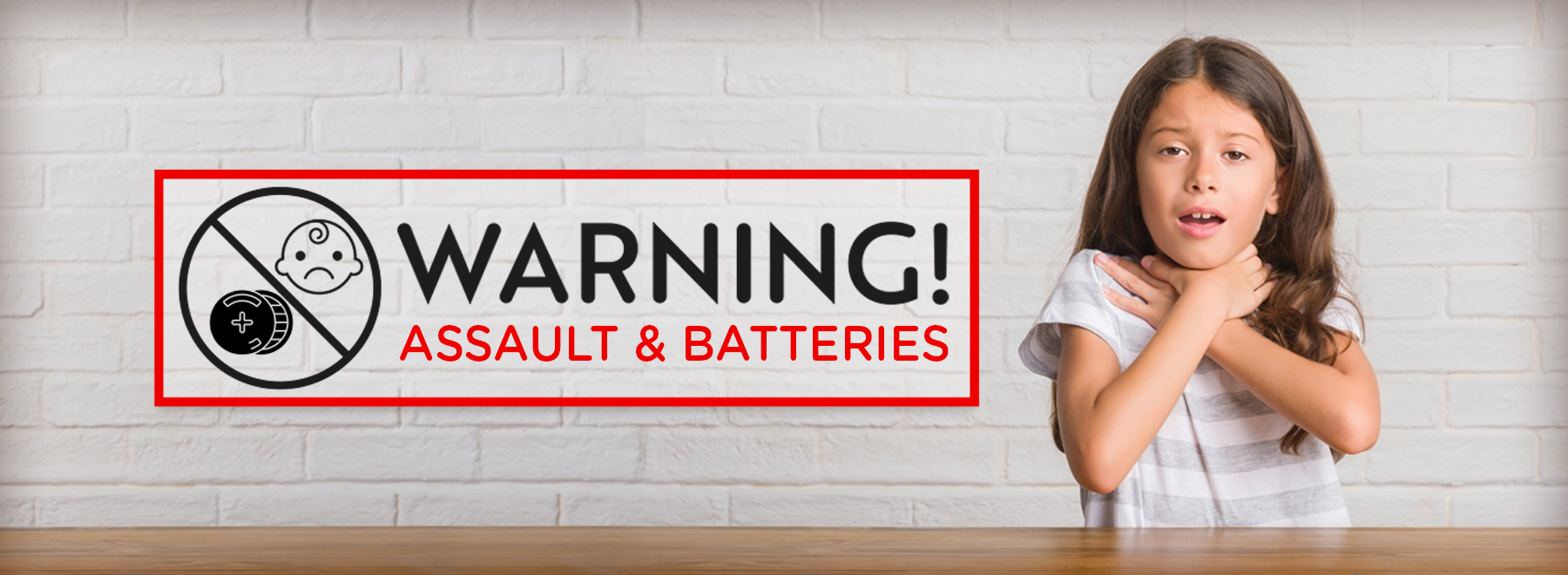Kids who swallow button-sized varieties risk injury – and worse
One day, in 1692, a 4-year-old boy swallowed a shoe buckle.
This incident is important for at least two reasons: One, it was the first recorded case of a child ingesting a foreign body; two, the child survived.
In fact, he grew up to be ruler of Prussia, Friedrich Wilhelm I, as related in a scholarly work published in 2017.
Regrettably, this unwelcome tradition is now 330 years old, and occurs under circumstances that often don’t end so well, not least of all in cases involving a shiny, but dangerous, lure called the “button battery.”

“We see a lot of this here,” said Dr. Barry Berch, professor of pediatric general and thoracic surgery, at Children’s of Mississippi Hospital at the University of Mississippi Medical Center. “You will see it pretty much at any children’s hospital, because children like to put things in their mouth – button batteries, coins, needles.
“A button battery will always get our attention because it can be very damaging if it’s stuck in a child’s esophagus.”

While coins are probably the most common objects swallowed by children, followed by toys or other blunt objects, “button batteries are among the most dangerous,” said Dr. Natalie Bhesania, assistant professor of pediatrics, gastroenterology, at UMMC.
“People may say, ‘Oh, they’re small; they will pass through the GI tract.’ But we’ve had a least one really bad button battery case in [gastroenterology] this year, a child who had to stay in the hospital for quite a while due to severe esophageal injury, which is very dangerous and potentially deadly.”
Battery-related injuries in general should produce a nightmare of numbers for parents of small children: More than 7,000 visits to emergency rooms from 2010 to 2019, as estimated in a study published in August by the journal, Pediatrics. That’s more than double the number recorded from 1990 to 2009.
Small children, especially those between the ages of 1 and 2, are in the highest-risk group. When a battery type could be pinpointed, the culprit in more than 87 percent of the ER visits was a button battery, the journal reported. And ingestion was credited with 90 percent of the battery-related ER visits.
Button batteries, which come in many sizes, are found in digital thermometers, car key fobs, smartwatches, penlights, mini-remotes, greeting cards that sing, clip-on reading lights, handheld games and toys, hearing aids, and so much more.
Unfortunately, they’re found on the floor sometimes, or in other child-frequented locations.
“It’s amazing to me what kids find, usually toddlers, those who are 1 to 3 years old,” Berch said. “Maybe it’s the fact that these batteries are shiny. When children eat a coin, it’s usually a new, shiny one.”
When children take in a foreign object, it’s best to take them to a children’s ER, Bhesania said. “And we [Children’s of Mississippi] are the only children’s hospital in the state; we are equipped with pediatric gastroenterologists, pediatric surgeons and other vital members of the medical team, who are needed to remove the object.”
When batteries are in the airway, otolaryngologists, or ENT’s, also see these cases.
“Many hospitals will not have specialists who can put a child to sleep,” Berch said, “or they may not have the equipment to take the battery out of a little kid.
“If this happens in a town an hour or two from Jackson, it would be best to come here first anyway, rather than sit around in an ER somewhere else and then have to be transferred here.
“Things are going to happen quicker at a children’s hospital, and that’s important because time is of the essence in these cases when the battery starts discharging and coating the esophagus.”
The batteries, often no bigger than a penny or a dime, of course, have a positive and negative side, Berch said. “So, when they’re wedged and come in contact with each side of the esophageal wall, they will discharge. That alkaline substance in the battery will liquify and cause a necrosis [death of body tissue] of the esophageal wall.”
The batteries must be taken out as soon as possible, he said. “Necrosis can immediately lead to bad infections in the chest. And with the heart and lungs nearby, it can pose a life-threating situation.”
Long-term, physicians may see these children develop strictures [abnormal narrowing] and perforations of the esophagus, Bhesania said.
“We have to go in an dilate the esophagus with balloons,” Berch said. “That requires an anesthetic and a procedure every time. Some children have had to be treated for weeks this way. Even after we get it out, we know that it can still cause damage to the esophageal wall, damage that will affect them the rest of their life.”
Animal studies have shown that damage can start to occur within 15 minutes, Bhesania said.
Batteries that make their way to the stomach pose a smaller risk. For one thing, Berch said, acid in the stomach will combat the alkaline discharge. In addition, the battery is not likely to become lodged in any other area within the GI tract.
“The majority of foreign bodies swallowed will pass through the GI tract,” Bhesania said. “Once they get bigger or sharper, that’s where we see the most damage. I’m sure there are plenty of cases we don’t see because the child has already passed it.”
Perhaps more perilous for a child’s stomach are multiple, BB-size magnets known as Buckyballs. “We see those too,” Bhesania said, “and they can cause tears in the abdominal wall if there are several; they can cause perforations at various points in the digestive tract, and the child needs surgery.”
For young children, the esophagus is especially problematic because of its slender diameter; things can easily stick there.
“Also, there may be some underlying pathology: kids who needed surgery for a variety of reasons in the past, strictures, or those who have a disease that affects the motility of the esophagus,” Bhesania said.
So, what can a parent do? At first blush, the advice seems clear-cut and obvious: Be ever-vigilant. But, as a parent of young children might tell you, that would mean never doing anything else.
“I have two kids at home, so I know that if you turn your head, anything can happen,” Bhesania said. “Kids will explore things with their mouths. That is developmentally normal.
“As a parent, I understand that you can be distracted. These aren’t negligent people. So, my advice is: If you don’t need button batteries in your house, get rid of them. If you need them, put them up in a high place, out of arm’s reach.
“Definitely lock them away if you can. I would treat it almost the same way as a firearm.”
The above article appears in CONSULT, UMMC’s monthly e-newsletter sharing news about cutting-edge clinical and health science education advances and innovative biomedical research at the Medical Center and giving you tips and suggestions on how you and the people you love can live a healthier life. Click here and enter your email address to receive CONSULT free of charge. You may cancel at any time.



